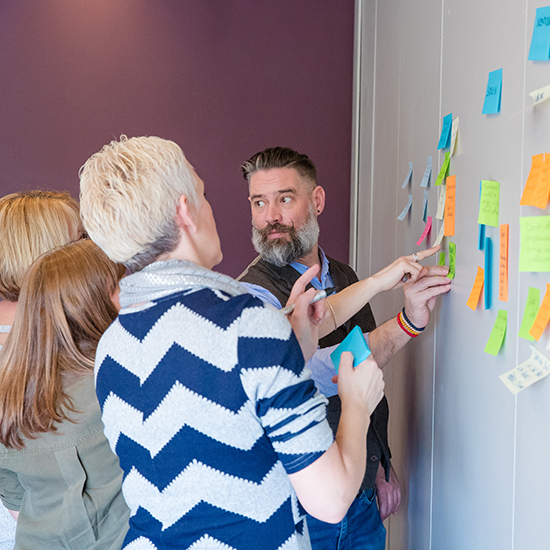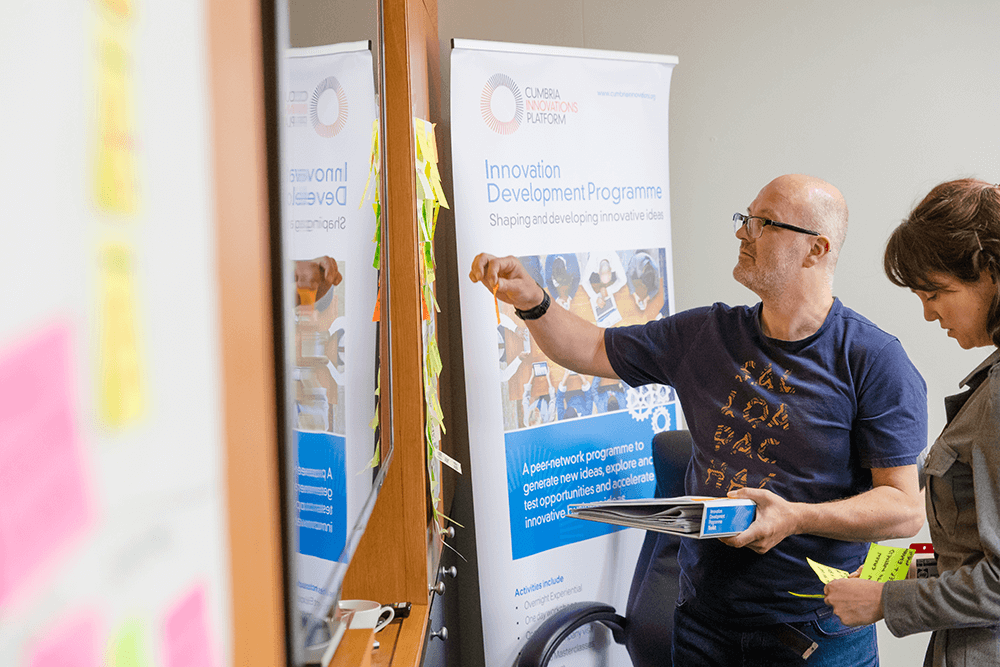The Challenges and Opportunities
Cumbria’s globally renowned landscape and natural assets, particularly the World Heritage status of the Lake District, has helped establish a vibrant and vital tourism visitor economy and hospitality sector.
Within this context, the county has forged a strong reputation for high quality food and drink, from the seafood sector in the West and the superior agricultural produce of Eden, to the artisan producers in South Lakeland and the big food processors in Carlisle.
The county shares the broader challenges facing the industry: rising costs, post-pandemic recovery, supply chain disruption, digitalisation and skills, sustainability and changing consumer demands. But it is also primed to benefit from the opportunities emerging from social shifts, including consumer trends, and advances in technology.
As a result, Lancaster University designed and delivered an Innovation Catalyst, bringing together business leaders from the SME community, academia and like-minded peers to address these multitude of challenges and opportunities.
The Process
Having designed and developed the Innovation Catalyst concept, Lancaster University has delivered seven programmes since 2019. This programme, known as CUSP II (Cumbria Innovations Platform) cohort two, was part funded by the European Regional Development Fund and led by Lancaster University in partnership with the University of Cumbria.
The project created a task force of SMEs from the food, drink and hospitality sectors, including AJ Lakes Consultancy, Austin Temple, Catering Partnerships, Cumbria Contract Bottling Company, Fell Brewery, Ginger Bakers, John Watt Catering, Lancaster and Lancaster Ltd, Ravenglass and Eskdale Railway Company, Tailored Goat Company and Zingibear.
The six-month programme began with a two-day activation process to collectively map out the goals, challenges and innovation needs. This resulted in an ambition statement which would shape their ongoing work: to enable a diverse and innovative food and drink ecosystem in Cumbria which fosters collaboration, localism and sustainability and promotes Cumbria as a world-class example.
Meanwhile, further break-out sessions created Challenge Action Groups, smaller teams of participants paired with university students and tasked with drilling down their ideas and establishing potential innovation projects.
These included:
- Tailored Goat, a free-range goat meat producer based in Penrith, explored creating a portal hub platform which enabled businesses to share resources to reduce costs and improve competitiveness against national brands.
- AJ Lakes, a hospitality training consultancy based in Windermere, researched potential methods of improving existing training programs in order to attract and retain the next generation in the hospitality industry.
- Austin Temple, owners of the 19th Century Augill Castle in Kirkby Stephen, explored ways of improving occupancy rates and reputational image.
- John Watt Catering, tea blenders and coffee roasters in Carlisle, is aiming to develop a month-long food festival and online portal to generate online sales and interest from external markets, such as Manchester and London.
- Catering Partnership, a commercial kitchen and laundry equipment supplier in Kendal, explored the opportunities of heat exchangers in their target sectors.
- Fell Bars, an independent brewery and bar chain, started a project to explore how it could achieve net zero carbon emissions.
- Lancaster and Lancaster, hospitality and tourism consultants in Broughton-In-Furness, explored ways of supporting Cumbrian businesses to develop solutions to achieve net zero, benefitting the businesses, consumers, and nature.
Over the coming months the group embarked on a series of investigative and action-focused ‘Innovation Collaboratories’. Facilitated by Lancaster University Management School and inviting contributions from external experts such as the Cumbria Chamber of Commerce, Langdale Hotel, Thomas Jardine & Co, Cumbria LEP, and Westmorland Ltd, owners of Tebay services, participants were given the opportunity to exchange knowledge, share expertise and resources to accelerate solutions.
But the process had mixed results, as partners struggled to reach a consensus of how they could collaborate.
Graham Heath, Managing Director of Catering Partnership, said: “Over the course of our meetings it became clear that while our mission statement was noble and a bold vision of the future, it was also overwhelming.
“The frank discussions exposed that SMEs by nature are very protective over their ideas and relationships, and that collaboration often goes against survival instincts. Many of us felt frustrated and that the process was doomed to failure, if it were not for the intervention of Tim Bloomer from Fell Bars who refocussed the group and sparked an achievable outcome.”
The Outcome and the Future
Tim encouraged the group to build on the achievement of the Catalyst by forming a dedicated B2B forum that encouraged Cumbrian food and drink businesses to collaborate on a much smaller scale and build on successes. Rather than a blueprint, it would be a catalyst for success.
As a result, the newly formed Cumbria Food and Drink Forum (CFDF), will stage a trade event at Fell Brewery in Kendal on February 3 where it will talk about the positive outcomes of the Innovation Catalyst process and the opportunities which have emerged. Its mission statement is to foster collaboration, localism and sustainability.
Tim said: “Beneath the noise and obstacles we achieved a great deal of value as a group. Landing on a consensus of how the sector should be and what we’d like to see happening is significant, given how SMEs normally operate in silos. If you put people in our position in a room together, with some stimulus, good things will come from it.
Alison Magee-Barker, Owner of AJ Lakes, said: “This first event is an informal starting point to explore and ignite collaboration around the themes of our work; inclusivity, equality, innovation, sustainability and true localism. It is an opportunity to begin having those conversations about the problems we all have and how we can help each other. We are looking forward to it becoming a regular event of like minded businesses building a successful future for Cumbria.
“Collaboration exists already. It’s about time we started to scale it. It’s time we began openly talking about our shared problems and finding common solutions, to share the burden.”
The Innovation Catalyst has also helped the participating businesses in a variety of ways.
Fell Bars has used the Catalyst to pursue a variety of collaborations. For example, it has begun sourcing Penrith-grown barley and whey waste from local cheesemakers for its brewing process. Meanwhile, its university project has given the business a detailed roadmap to achieve net zero in its scope one and two emissions including the installation of a biogas generator to use its waste to power its brewing operations.
Ginger Bakers will be sharing the positive experience of its partnership with Growing Well, the mental health charity and organic farm. Lisa Smith, owner of Ginger Bakers, believes offering volunteering opportunities for Growing Well participants has the potential to impact the skills shortage and create new jobs.
Austin Temple’s Catalyst project has improved the way that accommodation is marketed.
Wendy Bennet, owner, said: “Using student researchers we were able to extract and compile any negative online reviews we had accumulated over the last 25 years. This was a hard read but helped identify that the reason behind customer dissatisfaction was that our hotel was being marketed incorrectly via third party websites. It was enlightening. Making those changes has seen an immediate improvement.”
AJ Lakes’ project with the university saw student researchers analyse where and why hospitality as a career choice was thriving globally. The outcome of the study is prompting changes to how AJ Lakes’ markets the sector and its training.
Catering Partnership’s project to research the potential market of heat exchanger technology in commercial kitchens resulted in its potential application in refrigeration.
For Lancaster University the process has established new partnerships with the region’s SME community and cemented previous relationships, while exposing its students to research opportunities within their specialist subjects.
Jen Melling, Project Manager at Lancaster University, who led the group through the Catalyst process said she was delighted by the outcome.
“Every Innovation Catalyst brings together a unique group of individual businesses and organisations and there is never a guaranteed outcome,” she said.
“It is testament to the determination of this dynamic group and the process the university has developed that we were able to accelerate collaboration between these Cumbrian food and drink businesses.
“By giving them access to a unique combination of expertise and skill, and reducing the risk of research and development, there have been some significant outcomes for individual businesses, new collaborations uncovered, and a determined group of SMEs who were able to unite under a shared vision of what they want to achieve. We look forward to seeing how the ecosystem develops and realises its vision.”








